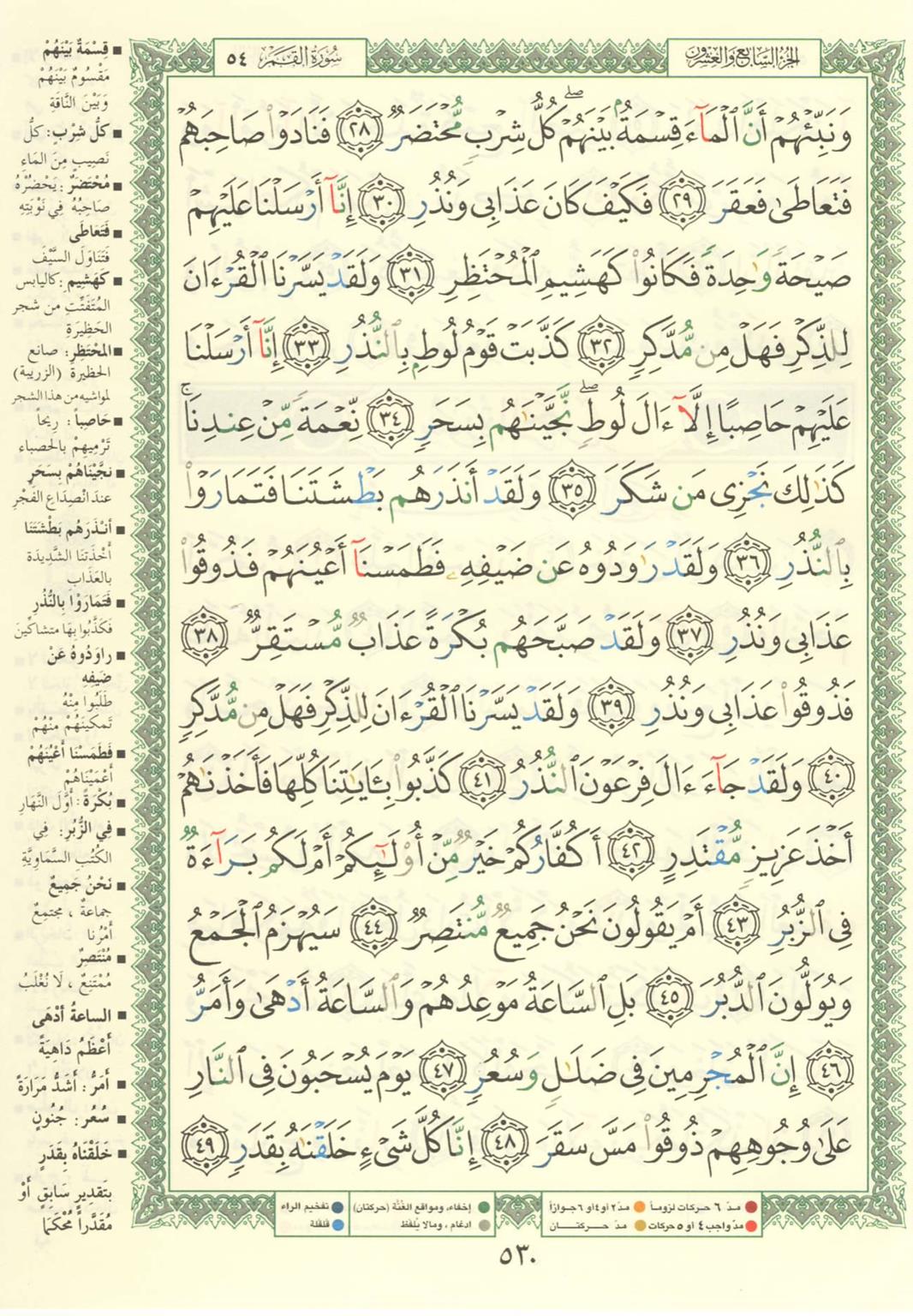Surah Qamar
Contents




Page 528
54:1
ق-ر-ب
![]() ٱقۡتَرَبَتِ
اِقْتَرَبَتِ
iq'tarabati
Has come near
ٱقۡتَرَبَتِ
اِقْتَرَبَتِ
iq'tarabati
Has come near
س-و-ع
![]() ٱلسَّاعَةُ
السَّاعَةُ
s-sāʿatu
the Hour
ٱلسَّاعَةُ
السَّاعَةُ
s-sāʿatu
the Hour
ش-ق-ق
![]() وَٱنشَقَّ
وَانْشَقَّ
wa-inshaqqa
and has split
وَٱنشَقَّ
وَانْشَقَّ
wa-inshaqqa
and has split
ق-م-ر
![]() ٱلۡقَمَرُ
الْقَمَرُ
l-qamaru
the moon.
ٱلۡقَمَرُ
الْقَمَرُ
l-qamaru
the moon.
54:2
ا-ن
![]() وَإِن
وَاِنْ
wa-in
And if
وَإِن
وَاِنْ
wa-in
And if
ر-ا-ي
![]() يَرَوۡاْ
یَّرَوْا
yaraw
they see
يَرَوۡاْ
یَّرَوْا
yaraw
they see
ا-ي-ا
![]() ءَايَةٗ
اٰیَةً
āyatan
a Sign,
ءَايَةٗ
اٰیَةً
āyatan
a Sign,
ع-ر-ض
![]() يُعۡرِضُواْ
یُّعْرِضُوْا
yuʿ'riḍū
they turn away
يُعۡرِضُواْ
یُّعْرِضُوْا
yuʿ'riḍū
they turn away
ق-و-ل
![]() وَيَقُولُواْ
وَیَقُوْلُوْا
wayaqūlū
and say,
وَيَقُولُواْ
وَیَقُوْلُوْا
wayaqūlū
and say,
س-ح-ر
![]() سِحۡرٞ
سِحْرٌ
siḥ'run
"Magic
سِحۡرٞ
سِحْرٌ
siḥ'run
"Magic
م-ر-ر
![]() مُّسۡتَمِرّٞ
مُّسْتَمِرٌّ
mus'tamirrun
continuing."
مُّسۡتَمِرّٞ
مُّسْتَمِرٌّ
mus'tamirrun
continuing."
54:3
ك-ذ-ب
![]() وَكَذَّبُواْ
وَكَذَّبُوْا
wakadhabū
And they denied
وَكَذَّبُواْ
وَكَذَّبُوْا
wakadhabū
And they denied
ت-ب-ع
![]() وَٱتَّبَعُوٓاْ
وَاتَّبَعُوْۤا
wa-ittabaʿū
and followed
وَٱتَّبَعُوٓاْ
وَاتَّبَعُوْۤا
wa-ittabaʿū
and followed
ه-و-ي
![]() أَهۡوَآءَهُمۡۚ
اَهْوَآءَهُمْ
ahwāahum
their desires,
أَهۡوَآءَهُمۡۚ
اَهْوَآءَهُمْ
ahwāahum
their desires,
ك-ل-ل
![]() وَكُلُّ
وَكُلُّ
wakullu
but (for) every
وَكُلُّ
وَكُلُّ
wakullu
but (for) every
ا-م-ر
![]() أَمۡرٖ
اَمْرٍ
amrin
matter
أَمۡرٖ
اَمْرٍ
amrin
matter
ق-ر-ر
![]() مُّسۡتَقِرّٞ
مُّسْتَقِرٌّ
mus'taqirrun
(will be a) settlement.
مُّسۡتَقِرّٞ
مُّسْتَقِرٌّ
mus'taqirrun
(will be a) settlement.
54:4
ق-د
![]() وَلَقَدۡ
وَلَقَدْ
walaqad
And certainly
وَلَقَدۡ
وَلَقَدْ
walaqad
And certainly
ج-ي-ا
![]() جَآءَهُم
جَآءَهُمْ
jāahum
has come to them
جَآءَهُم
جَآءَهُمْ
jāahum
has come to them
م-ن
![]() مِّنَ
مِّنَ
mina
of
مِّنَ
مِّنَ
mina
of
ن-ب-ا
![]() ٱلۡأَنۢبَآءِ
الْاَنْۢبَآءِ
l-anbāi
the information
ٱلۡأَنۢبَآءِ
الْاَنْۢبَآءِ
l-anbāi
the information
م-ا
![]() مَا
مَا
mā
wherein
مَا
مَا
mā
wherein
ف-ي
![]() فِيهِ
فِیْهِ
fīhi
wherein
فِيهِ
فِیْهِ
fīhi
wherein
ز-ج-ر
![]() مُزۡدَجَرٌ
مُزْدَجَرٌ
muz'dajarun
(is) deterrence,
مُزۡدَجَرٌ
مُزْدَجَرٌ
muz'dajarun
(is) deterrence,
54:5
ح-ك-م
![]() حِكۡمَةُۢ
حِكْمَةٌ
ḥik'matun
Wisdom
حِكۡمَةُۢ
حِكْمَةٌ
ḥik'matun
Wisdom
ب-ل-غ
![]() بَٰلِغَةٞۖ
بَالِغَةٌ
bālighatun
perfect,
بَٰلِغَةٞۖ
بَالِغَةٌ
bālighatun
perfect,
م-ا
![]() فَمَا
فَمَا
famā
but not
فَمَا
فَمَا
famā
but not
غ-ن-ي
![]() تُغۡنِ
تُغْنِ
tugh'ni
will avail
تُغۡنِ
تُغْنِ
tugh'ni
will avail
ن-ذ-ر
![]() ٱلنُّذُرُ
النُّذُرُ
n-nudhuru
the warnings.
ٱلنُّذُرُ
النُّذُرُ
n-nudhuru
the warnings.
54:6
و-ل-ي
![]() فَتَوَلَّ
فَتَوَلَّ
fatawalla
So turn away
فَتَوَلَّ
فَتَوَلَّ
fatawalla
So turn away
ع-ن
![]() عَنۡهُمۡۘ
عَنْهُمْ ۘ—
ʿanhum
from them.
عَنۡهُمۡۘ
عَنْهُمْ ۘ—
ʿanhum
from them.
ي-و-م
![]() يَوۡمَ
یَوْمَ
yawma
(The) Day,
يَوۡمَ
یَوْمَ
yawma
(The) Day,
د-ع-و
![]() يَدۡعُ
یَدْعُ
yadʿu
will call
يَدۡعُ
یَدْعُ
yadʿu
will call
د-ع-و
![]() ٱلدَّاعِ
الدَّاعِ
d-dāʿi
the caller
ٱلدَّاعِ
الدَّاعِ
d-dāʿi
the caller
ا-ل-ي
![]() إِلَىٰ
اِلٰی
ilā
to
إِلَىٰ
اِلٰی
ilā
to
ش-ي-ا
![]() شَيۡءٖ
شَیْءٍ
shayin
a thing
شَيۡءٖ
شَیْءٍ
shayin
a thing
ن-ك-ر
![]() نُّكُرٍ
نُّكُرٍ
nukurin
terrible,
نُّكُرٍ
نُّكُرٍ
nukurin
terrible,
54:7
خ-ش-ع
![]() خُشَّعًا
خُشَّعًا
khushaʿan
(Will be) humbled
خُشَّعًا
خُشَّعًا
khushaʿan
(Will be) humbled
ب-ص-ر
![]() أَبۡصَٰرُهُمۡ
اَبْصَارُهُمْ
abṣāruhum
their eyes
أَبۡصَٰرُهُمۡ
اَبْصَارُهُمْ
abṣāruhum
their eyes
خ-ر-ج
![]() يَخۡرُجُونَ
یَخْرُجُوْنَ
yakhrujūna
they will come forth
يَخۡرُجُونَ
یَخْرُجُوْنَ
yakhrujūna
they will come forth
م-ن
![]() مِنَ
مِنَ
mina
from
مِنَ
مِنَ
mina
from
ج-د-ث
![]() ٱلۡأَجۡدَاثِ
الْاَجْدَاثِ
l-ajdāthi
the graves
ٱلۡأَجۡدَاثِ
الْاَجْدَاثِ
l-ajdāthi
the graves
ك-ا-ن
![]() كَأَنَّهُمۡ
كَاَنَّهُمْ
ka-annahum
as if they (were)
كَأَنَّهُمۡ
كَاَنَّهُمْ
ka-annahum
as if they (were)
ج-ر-د
![]() جَرَادٞ
جَرَادٌ
jarādun
locusts
جَرَادٞ
جَرَادٌ
jarādun
locusts
ن-ش-ر
![]() مُّنتَشِرٞ
مُّنْتَشِرٌ
muntashirun
spreading,
مُّنتَشِرٞ
مُّنْتَشِرٌ
muntashirun
spreading,
54:8
ه-ط-ع
![]() مُّهۡطِعِينَ
مُّهْطِعِیْنَ
muh'ṭiʿīna
Racing ahead
مُّهۡطِعِينَ
مُّهْطِعِیْنَ
muh'ṭiʿīna
Racing ahead
ا-ل-ي
![]() إِلَى
اِلَی
ilā
towards
إِلَى
اِلَی
ilā
towards
د-ع-و
![]() ٱلدَّاعِۖ
الدَّاعِ ؕ—
d-dāʿi
the caller.
ٱلدَّاعِۖ
الدَّاعِ ؕ—
d-dāʿi
the caller.
ق-و-ل
![]() يَقُولُ
یَقُوْلُ
yaqūlu
Will say
يَقُولُ
یَقُوْلُ
yaqūlu
Will say
ك-ف-ر
![]() ٱلۡكَٰفِرُونَ
الْكٰفِرُوْنَ
l-kāfirūna
the disbelievers,
ٱلۡكَٰفِرُونَ
الْكٰفِرُوْنَ
l-kāfirūna
the disbelievers,
ه-ا-ذ
![]() هَٰذَا
هٰذَا
hādhā
"This
هَٰذَا
هٰذَا
hādhā
"This
ي-و-م
![]() يَوۡمٌ
یَوْمٌ
yawmun
(is) a Day
يَوۡمٌ
یَوْمٌ
yawmun
(is) a Day
ع-س-ر
![]() عَسِرٞ
عَسِرٌ
ʿasirun
difficult."
عَسِرٞ
عَسِرٌ
ʿasirun
difficult."
54:9
ك-ذ-ب
![]() ۞كَذَّبَتۡ
كَذَّبَتْ
kadhabat
Denied
۞كَذَّبَتۡ
كَذَّبَتْ
kadhabat
Denied
ق-ب-ل
![]() قَبۡلَهُمۡ
قَبْلَهُمْ
qablahum
before them
قَبۡلَهُمۡ
قَبْلَهُمْ
qablahum
before them
ق-و-م
![]() قَوۡمُ
قَوْمُ
qawmu
(the) people
قَوۡمُ
قَوْمُ
qawmu
(the) people
ن-و-ح
![]() نُوحٖ
نُوْحٍ
nūḥin
(of) Nuh,
نُوحٖ
نُوْحٍ
nūḥin
(of) Nuh,
ك-ذ-ب
![]() فَكَذَّبُواْ
فَكَذَّبُوْا
fakadhabū
and they denied
فَكَذَّبُواْ
فَكَذَّبُوْا
fakadhabū
and they denied
ع-ب-د
![]() عَبۡدَنَا
عَبْدَنَا
ʿabdanā
Our slave
عَبۡدَنَا
عَبْدَنَا
ʿabdanā
Our slave
ق-و-ل
![]() وَقَالُواْ
وَقَالُوْا
waqālū
and said,
وَقَالُواْ
وَقَالُوْا
waqālū
and said,
ج-ن-ن
![]() مَجۡنُونٞ
مَجْنُوْنٌ
majnūnun
"A madman,"
مَجۡنُونٞ
مَجْنُوْنٌ
majnūnun
"A madman,"
ز-ج-ر
![]() وَٱزۡدُجِرَ
وَّازْدُجِرَ
wa-uz'dujira
and he was repelled.
وَٱزۡدُجِرَ
وَّازْدُجِرَ
wa-uz'dujira
and he was repelled.
54:10
د-ع-و
![]() فَدَعَا
فَدَعَا
fadaʿā
So he called
فَدَعَا
فَدَعَا
fadaʿā
So he called
ر-ب-ب
![]() رَبَّهُۥٓ
رَبَّهٗۤ
rabbahu
his Lord,
رَبَّهُۥٓ
رَبَّهٗۤ
rabbahu
his Lord,
ا-ن-ن
![]() أَنِّي
اَنِّیْ
annī
"I am
أَنِّي
اَنِّیْ
annī
"I am
غ-ل-ب
![]() مَغۡلُوبٞ
مَغْلُوْبٌ
maghlūbun
one overpowered,
مَغۡلُوبٞ
مَغْلُوْبٌ
maghlūbun
one overpowered,
ن-ص-ر
![]() فَٱنتَصِرۡ
فَانْتَصِرْ
fa-intaṣir
so help."
فَٱنتَصِرۡ
فَانْتَصِرْ
fa-intaṣir
so help."

